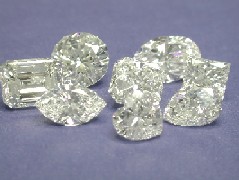Campaigns
 |
Press Release 14th February 2005 Immediate Release
Diamonds - Be Doubtful |
Marilyn Monroe affirmed that diamonds were a girl's best friend but if she knew then, what we know now, she would make a more modest claim, it was stated yesterday (14 th Feb) at the launch of a national awareness campaign on diamonds and development.
"Did the gem on her finger cost another human being his or her hand?" asked Martin Rowan, Secretary of the Sierra Leone Ireland Partnership, which has started a campaign to raise public awareness, particularly among jewellers and customers, of the negative impact that the diamond trade has had on poor countries, particularly Sierra Leone.
"Simple scepticism on the part of customers could turn diamonds into a future force for development rather than a permanent source of grievance," he said.
SLIP has appealed to Irish consumers to ask questions about the origin of the diamonds they are being offered and to refuse to buy diamonds, which do not have reliable certification. It is also seeking to ensure compliance of the Irish jewellery trade with the international voluntary Code of Conduct proclaimed by the diamond industry in January 2003.
Meanwhile, it has called on the Irish Government to study and support the initiative in Sierra Leone undertaken by the British and US Government development agencies in a bid to make the monitoring of the diamond trade effective and to ensure that diamonds do not come to our fingers via smugglers, terrorists, criminals and slave masters.
Mr Rowan stated: "Diamonds have dominated the history of Sierra Leone for the last 50 years but Sierra Leone has also influenced the history of diamonds. That diamonds acquired through the unprecedented atrocities of the civil war in Sierra Leone (1991-2001) could be marketed as symbols of love and commitment, exposed the unregulated and highly secretive international trading system in diamonds."
Diamonds were discovered in Sierra Leone in the 1930's and became a substantial source of foreign exchange until 1991 when the civil war erupted. During the 10- year conflict, diamonds were the main source of finance for the insurgents and the scale of diamond smuggling increased out of all control as the gems were exchanged for weapons and ammunition at the Liberian border. The scale of the trauma - both physical and mental - inflicted on those who were forced into mining and 'carrying' was appalling.
A United Nations Security Council ban on the export of diamonds from Sierra Leone , imposed in July 2000, was lifted on June 4 th 2003 . However, corruption and illicit trading continue to blight the diamond industry within Sierra Leone and ensure that the local population and economy are deprived of the benefits of this rich natural resource.
Over $45m worth of diamonds left Sierra Leone through unofficial channels in 2002. It is estimated that the illegal smuggling of diamonds from Sierra Leone has denied the state $400 million over the past 15 years. Mines Monitoring Officers calculate that half of the country's diamond production is smuggled out of the country. The US Agency for International Development puts the figure at 90%
Mr Rowan continued: " Despite producing spectacularly large stones like the 970 carat 'Star of Sierra Leone,' the people of Sierra Leone have benefited little from having diamonds under their feet. Indeed, Sierra Leone remains one of the poorest countries in the world."
Mr Rowan called on Irish consumers to help local mining communities and the Sierra Leone economy. He said that people should insist that their jeweler provides them with a warranty guaranteeing "the diamonds herein invoiced have been purchased from legitimate sources."
A World Bank report of May 2003 concluded that while diamonds had fuelled an economic miracle in Botswana , it had led to the total economic collapse of Sierra Leone .
In 1961, the average income of the two diamond-rich African countries was $1,070. Today Botswana is a stable democracy with a per-capita income of about $8,000. By contrast, Sierra Leone is one of the most impoverished countries in the world with a GDP per capita of $520.
Mr Rowan concluded: " Sierra Leone 's domestic economy is being deprived of the valuable revenues needed for job creation, social amenities, healthcare sanitation and education. Diamond revenue to the Government would be dramatically increased if consumers in Dublin , Dubai or Detroit demanded that the diamonds they are buying were from ethical certified sources and thus stop the illicit trade in diamonds."
"This certification is not too much to ask of the trade " he said "after all consumers demanded authentic scientific certification of the origin of the beef they were eating and they got it. A transparent trail from mine to market is not too much to ask for such a highly priced and highly prized product like diamonds."
